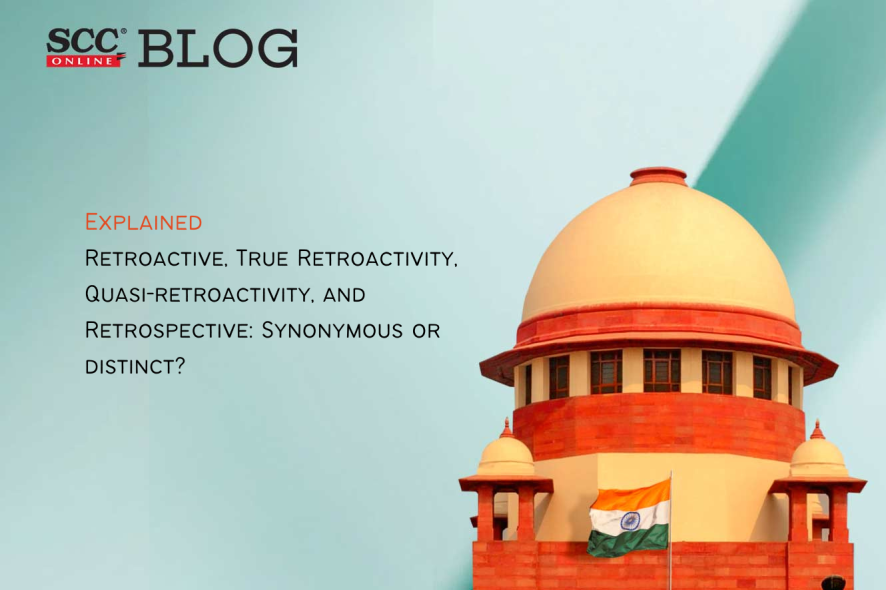Supreme Court: While adjudicating a case related to the Reliance Commercial Finance resolution, the 3-judges Bench comprising Dr. D Y Chandrachud*, Surya Kant, and A S Bopanna, JJ., was posed with a question as to whether the SEBI Standardisation of procedure Circular (13-10-2020) has retroactive application. The Court clarified,
“Many decisions of this Court define ‘retroactivity’ to mean laws that destroy or impair vested rights, in real terms, this is the definition of ‘retrospectivity’ or ‘true retroactivity’.”
On one hand, SEBI argued that the circular will have a retroactive application, on the other, Reliance Commercial Finance Ltd., argued that applying the circular on the instant case would make its application retrospective. The Court held that the SEBI Circular has retroactive application by relying on the following definitions:
In Principles of Statutory Interpretation by Justice G.P. Singh (14th Edn., 2016 at p. 583), it is stated that the rule against retrospective construction is not applicable to a statute merely because “a part of the requisites for its action is drawn from a time antecedent to its passing.” If that were not so, every statute will be presumed to apply only to persons born and things which come into existence after its operation and the rule may well result in virtual nullification of most of the statutes.
Significant Precedents
In Vineeta Sharma v. Rakesh Sharma, 2020 (9) SCC 1, the Court described the nature of prospective, retrospective, and retroactive laws as follows:
“The prospective statute operates from the date of its enactment conferring new rights. The retrospective statute operates backwards and takes away or impairs vested rights acquired under existing laws. A retroactive statute is the one that does not operate retrospectively. It operates in futuro. However, its operation is based upon the character or status that arose earlier. Characteristic or event which happened in the past or requisites which had been drawn from antecedent events.”
Noticing that the terms “retrospective” and “retroactive” are often used interchangeably, though their meanings are distinct, the Court referred to State Bank’s Staff Union (Madras Circle) v. Union of India, (2005) 7 SCC 584, where this difference was succinctly appreciated in the following words:
“’Retroactivity’ is used to cover at least two distinct concepts. The first, which may be called ‘true retroactivity’, consists in the application of a new rule of law to an act or transaction which was completed before the rule was promulgated. The second concept, which will be referred to as ‘quasi-retroactivity’, occurs when a new rule of law is applied to an act or transaction in the process of completion…the foundation of these concepts is the distinction between completed and pending transactions….” (T.C. Hartley, The Foundations of European Community Law 129 (1981)
Conclusion
The Court clarified that though many decisions of the Court define “retroactivity” to mean laws that destroy or impair vested rights, in real terms, this is the definition of “retrospectivity” or “true retroactivity”. “Quasi-retroactivity” or simply “retroactivity” on the other hand is a law that is applicable to an act or transaction that is still underway. Such an act or transaction has not been completed and is in the process of completion. Retroactive laws also apply where the status or character of a thing or situation arose prior to the passage of the law.
[SEBI v. Rajkumar Nagpal, 2022 SCC OnLine SC 1119, decided on 30-08-2022]
*Judgment by: Justice Dr. D Y Chandrachud
Appearance:
For SEBI: N Venkataraman, Senior Counsel & Additional Solicitor General
For RCFL: Darius Khambata, Senior Counsel
For Bank of Baroda: KV Viswanathan, Senior Counsel
For Authum Investment and Infrastructure Ltd.: Dhruv Mehta, Senior Counsel
*Kamini Sharma, Editorial Assistant has put this report together.
Also Read







